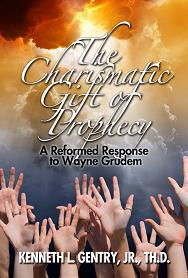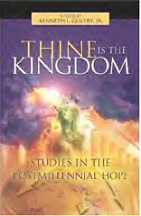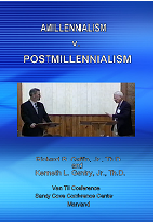OVER-REALIZED ESCHATOLOGY AT CORINTH (1)
PMW 2022-091 by Kenneth L. Gentry, Jr.
Christ’s resurrection and ours
First Corinthians 15 is an important chapter regarding the resurrection. Here Paul clearly ties the believer’s resurrection to Christ’s, requiring that we understand both in the same way (Phil. 3:20–21). For he states that Christ’s resurrection was the “first fruits” of the believer’s resurrection (1 Cor. 15:20). This first fruits image establishes two important truths:
(1) Christ’s resurrection is actually the beginning of the general resurrection of the dead. This is because the first fruits of a harvest are a part of the full, final harvest, though occurring before the full harvest (cf. 1 Cor. 15:12–13).
(2) As the first fruits of the resurrection, Christ’s resurrection serves as a divine promise that our resurrection body will be like his. The first fruits of wheat are also wheat. Thus, like him we will have a physical body though it will be glorified and incorruptible (1 Cor. 15:42–43, 52–54). For after his resurrection, Christ’s tomb where his physical body was placed was empty (John 20:1–7), he was seen alive (1 Cor. 15:5–7) and could be touched and felt (Matt. 28:9; Luke 24:39; John 20:27) by witnesses.
So, as C. K. Barrett notes in his commentary on 1 Corinthians (p. 350), the word means “the first instalment [sic] of the crop which foreshadows and pledges the ultimate offering of the whole.”
Though we are currently spiritually resurrected (John 5:24–25; Eph. 2:6; Col. 2:13; 3:1; 1 John 3:14), like Paul we still today continue to await “the redemption of our bodies” (Rom. 8:23). This will occur on the final day of temporal history at the resurrection of the dead (John 6:40, 44, 54; 11:24).
 Why I Left Full-Preterism (by Samuel M. Frost)
Why I Left Full-Preterism (by Samuel M. Frost)
Former leader in Full Preterist movement, Samuel M. Frost, gives his testimony and theological reasoning as to why he left the heretical movement. Good warning to others tempted to leave orthodox Christianity.
See more study materials at: KennethGentry.com
Paul’s teaching and current naivete
Unfortunately, too many Christians do not carefully analyze passages in terms of their original settings. This is especially the case when they are busy trying to establish a whole new theology to overthrow the historic, corporate, public, universal, systematic Christian faith. The fifteenth chapter in 1 Corinthians is easily misunderstood if one simply jumps into it and interprets it by a surface understanding of certain words, rather than by using Paul’s contextual meaning.
Because of this superficial approach, many orthodox Christians are confused about Paul’s statement that when we are resurrected we will have a “spiritual [pneumatikos] body” (1 Cor. 15:41). They believe this wording speaks of an immaterial, intangible, ethereal spirit-body and forbids the notion of a material physical body. If that were a proper interpretation of the word “spiritual” (pneumatikos), however, we would have to believe that the Christian who properly understands God’s thoughts (1 Cor. 2:11–14) has an immaterial body – for “he who is spiritual appraises all things” (1 Cor. 2:15). In fact, several Bible versions legitimately translate 1 Corinthians 2:15 as “spiritual man” or “spiritual person” (English Standard Version; Amplified Bible; Revised Standard Version; New American Bible Revised Edition; Contemporary English Version; God’s Word Translation; International Standard Version; Phillips Bible).
On this naive understanding of pneumatikos in 1 Corinthians 3:1, Paul would be wishing that the Corinthians were ethereal spirit-beings. For there the same word is used for faithful, committed Christians: “I could not speak to you as spiritual [pneumatikois] men” (see also 14:37). The same would be true in Galatians 6:1, where we read “Brethren, even if one is caught in any trespass, you who are spiritual [pneumatikoi], restore such a one.” Surely Paul is not calling on Christians who are spirit-beings to help the fallen brother. And should we believe that the children of Israel who crossed through the sea ate immaterial food and drank immaterial drink, because Paul says that they ate “spiritual” (pneumatikon) food and drank “spiritual” (pneumatikon) drink (1 Cor. 10:3–4). No wonder they were hungry (Exo. 16:3)!
Then to make matters worse, these Christians stumble once again by misconstruing what Paul means by declaring that “flesh and blood cannot inherit the kingdom of God” (v. 40). They wrongly suppose that this means that in eternity we will not have “flesh and blood” bodies, i.e., physical bodies. But that is not at all what Paul is arguing.
Why Not Full-Preterism? by Steve Gregg
This work exposes some of the key flaws in Hyperpreterism by someone who has formally debated them. Much insightful material for those who might be tempted to forsake historic Christian orthodoxy.
For more Christian educational materials: www.KennethGentry.com
Paul’s context and proper understanding
An important first step in understanding Paul’s wording is to understand the peculiar problem he is facing in Corinth and the consequent method he employs to confront it. This will not immediately explain his expressions in 1 Corinthians 15, of course, but it will put the interpreter on the right track for tracing Paul’s logic, and therefore for understanding why he chose the words that he did.
Unfortunately, in this post I will not be analyzing the verses about the “spiritual” or “heavenly” bodies that trip up naive interpreters (e.g., vv. 40, 41, 44, and 48). Rather I will be giving a short introduction to and summary of the problem Paul is facing. This is a necessary first step to properly seeking Paul’s meaning.
To be continued.
Click on the following images for more information on these studies:



Kenneth L. Gentry Jr.'s Blog
- Kenneth L. Gentry Jr.'s profile
- 85 followers



